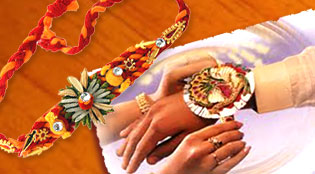Raksha Bandhan Muhurat 2024, 19th August
 Raksha Bandhan is the symbol of unbreakable bond between the love of brother and
sister, beyond any religion or class. The bond of love and trust formed by tying
of Rakhi to brother, can not be expressed in words. The most beautiful aspect of
this festival is that dose not believe in the bond of religion or cast. The festival
is praised all over the world because of this quality.
Raksha Bandhan is the symbol of unbreakable bond between the love of brother and
sister, beyond any religion or class. The bond of love and trust formed by tying
of Rakhi to brother, can not be expressed in words. The most beautiful aspect of
this festival is that dose not believe in the bond of religion or cast. The festival
is praised all over the world because of this quality.
If a work is performed in the favorable time period, its auspiciousness increases. To make the bond of brother and sister unbreakable, tying of Rakhi should be done in the Muhrat time(auspicious period).
Raksha Bandhan Favorable time
This year Raksha bandhan will be celebrated on 19th August.
The full moon date of Shravan month will start from 27:05 on 18th August 2024 and will prevail till 23:56 on 19th August 2024. The effect of Bhadra will be from 27:05 on 18th August to 13:31 on 19th August. Bhadra time is considered during Raksha Bandhan.
It is favorable to perform Raksha Bandhan as it is Bhadra free time. If this work has to be done during Bhadra period, then it should be done in Bhadra Puchch period, leaving Bhadra Mukh. On 19th August, the Bhadra free time of Raksha Bandhan will be after 13:31 in the afternoon.
Bhadra Puchch time will be from 09:52 to 10:55 am
Bhadra Mukha time will be from 10:55 to 12:13.
Whenever any work is done in auspicious time, the auspiciousness of that work increases. To make the relationship of brother and sister unbreakable, this Rakhi tying work should be done in auspicious time.
Auspicious Muhurta for Rakhi Tying
This year in 2024, the festival of Raksha Bandhan will be celebrated on 19 August. Time of Raksha Bandhan ritual on 19 August - Time of Raksha Bandhan ritual - will be after 13:31
On August 19, the entire Pradosh period will be free from Bhadra. Pradosh period time will be from 18:50 to 21:05.
Rahukaal time on August 19 from 07:31 to 09:08 am.
Rakhi Abhijit Muhurat will be from 11:58 to 12:51 on 2024.
Generally, in northern India including Punjab, Delhi, Haryana, etc., the auspicious work of tying Rakhi is done in the morning. According to tradition, if a person has to do Raksha Bandhan in Bhadra Kaal due to circumstances, then it is auspicious to do Raksha Bandhan in Bhadra-Puchh Kaal, leaving Bhadra Mukh. According to the scriptures, working in the tail period of Bhadra leads to success and victory. But the tail period of Bhadra should be used for auspicious works only in special circumstances.
Raksha Bandhan Festival: Brother’s Responsibilities Awareness
According to the Veda scriptures, Rakshika in modern time is known by the name of Rakhi. Raksha Sutra is called Rakhi in conversational language. It means to do protection. Protection(Raksha) means to stay for or to give promise of safety.
Importance of Shravan Masa Purnima increases as this day efforts begin to gain victory of virtue over sin, good works over evil, sufferings of man. A person won wants to win over his enemies or competitors should worship Lord Varun on this day.
In south India, not only Hindu, but also Muslims and Sikh and Christan offer coconut and flowers on the banks of water bodies, as this offering is considered auspicious. Coconut is considered as a form of Lord Shiva. Coconut has three eyes as of Lord Shiva.
Thread Related other Customs
In the Hindu religion every Puja has a custom of tying Kalawa(auspicious thread). This thread is tied to a person from Upnayan Sanskar to his Antim Sanskar. Thread of Rakhi is the token of emotional unity. It is a thread of love and faith. Sanskar accomplished by thread include chiefly the Upanyan Sanskar, marriage and Raksha Bandhan.
From time immemorial there is a tradition of tying thread around the tree. Ladies tie a thread around the Banyan tree and worship it with Roli, Akshat(rice used in Puja), sandalwood, incense stick and lamp, for the longevity of their husbands. There is a belief that tying thread around Amla, keeps the family in full health and wealth.
Thread gives power to brothers so that they can be capable of protecting their sisters. The symbol of Shravan, festival of Rakhi, slowly gained popularity in other states apart from Rajashtan. And, called by the names Son, Sona or Sarman.


